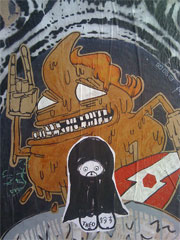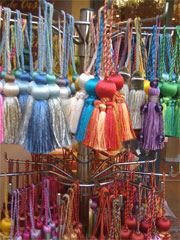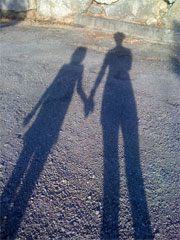Standing Up
“Four bad things happened today,” Short-pants announced when I went to pick her up at school one day last week.
I resisted the urge to re-direct her to what was good about the day – an evaluation method I use in my profession suggests a thorough inventory of the positives before listing the concerns – instead, I let her tell me everything she wants to tell me, in whatever order she preferred. I want her to develop the habit of confiding in me. Correcting her syntax about how she reports the day’s events won’t help to keep the channel open. We’re still years away from her sullen adolescence, but I’m planting any seeds I can.

The liabilities of the day were not so grave, for an adult. She even seemed to have them in perspective. They annoyed rather than upset her, although the boundary between those two territories is rather thin. Somebody – a boy who often picks on her – was pulling on her hood as they climbed the stairs. When she turned to ask him to please stop he gave her the French shrug: “I didn’t do anything.”
Later in the lunch line, two girls behind her tapped her on the shoulder, and when she turned around, acted as if they’d never touched her. “It bothered me,” she said, “that they would actually think I didn’t know it was them.”
And so it begins. I’ve suspected she’s a target for teasing. And since teasing often leads to bullying, I wonder if that’s possibly what’s ahead.
The other two incidents were equally benign (and probably normal) on the scale of mean things kids do to each other, but the accumulation of wasted gestures and silly pretending put Short-pants in a bad mood.
“Why do they pick on you?” Buddy-roo asked later, when we were talking about it at dinner. “Because I’m an outlier, a bit of a loner,” she answered, matter-of-factly. I regarded her with that mixture of pride and confusion. How amazing that she can so coolly describe herself, and how does she know that about herself?
“Papa told me I might get teased a little and that would be why.” I’m glad she talks to De-facto about it, too. She’s getting feedback from two genders of sounding board.
A few months ago I purchased a book and tucked it into my closet, waiting for the day that it would seem relevant to pass on to her. This felt  like it was the right day. Despite the fact that it is from the American Girl franchise, one that’s over-the-top merchandising horrifies and impresses me at once, it is a well-conceived text. Straight forward, plain language, esteem-building advice for young girls about bullying, being bullied or just observing the act. Short-pants is a bookish type, you can talk to her about anything, but if she sees it in a book, it reaches some understanding place deeper inside of her than simple conversation can penetrate. So whenever I want to help her out, or make a point, I find a book about it.
like it was the right day. Despite the fact that it is from the American Girl franchise, one that’s over-the-top merchandising horrifies and impresses me at once, it is a well-conceived text. Straight forward, plain language, esteem-building advice for young girls about bullying, being bullied or just observing the act. Short-pants is a bookish type, you can talk to her about anything, but if she sees it in a book, it reaches some understanding place deeper inside of her than simple conversation can penetrate. So whenever I want to help her out, or make a point, I find a book about it.
She read the title of the book, Stand up For Yourself and Your Friends, and squealed with delight, “American Girl!” She cares little about the dolls and their accessories but has devoured the books – which contain great stories portraying how girls in other generations have grown up. She ran upstairs and I didn’t hear from her for over an hour. She read the whole book in one sitting. And then read it again. She came downstairs standing tall and empowered.
I have been waiting – obviously, since I bought a book about it – for the days when Short-pants would be teased at school. There have been a few incidents, the perpetrator always one of a handful of predictably mischievous boys. But what disturbs me is that maybe the girls are starting now to pick on her, and when pre-adolescent girls start, they get worse. And when they get mean, they get mean.
Up until now, the fact that she’s so sweet and kind and a little quirky has seemed to amuse her classmates as much as us. She is a loner, but not because other kids didn’t ask her to play. She often refuses their invitations, opting to wander around the school courtyard on her own, making up her own poems and rhymes, plunging into her rich inner life. But there you find the catch-22. As she refuses, repeatedly, they cease to ask her. And the less she is “with” them, the greater the odds that they will turn “against” her.

Whether kids are the most popular in class, the geek, the jock, the brainiac, the chatterbox (that would be Buddy-roo) or the loner, there is no way to protect them from the backlash of their particular role. The popular kids will be envied and bad-mouthed, the jocks adulated in person but derided behind their back for their “lesser” intelligence, the geeks ignored but stereotyped nonetheless. Protection is useless; it’s even counter-productive. The trials of childhood graduate to those of adolescence and prepare us for the occasional cruelties of life. How else would we thicken our skin?
I know I can’t protect her. But I can help her to be prepared, and I guess that’s what I’m trying to do. The question is, how do I prepare myself?


April 9th, 2011 at 7:39 pm
I want to buy your book!! (Where/when is it?!) I loved this, but made me weepy for your “sweet, kind, quirky one” and mine!
April 9th, 2011 at 8:25 pm
I’m sure you’ve heard of (or seen) the film “Mean Girls.” It’s based on a nonfiction book that you may also have read called “Queen Bees and Wannabes” by Rosalind Wiseman. I read it when my daughter was in about fifth-grade, when the girls seemed to start creating roles for themselves and each other. It’s made it easier for me to be able to figure out where my child fits, though the kids don’t really fit all the way into any of the “archetypes.” Still helpful.
Amazing how self-aware Short Pants is. My daughter doesn’t take herself too seriously, so when she is teased (or even bullied a little, though she doesn’t see it that way), it seems to roll off more easily than it did for me.
Also, you my end up being blessed like I am to have a child who decides that adolescence does NOT have to be sullen.
April 10th, 2011 at 2:43 am
Obiously you have met Tove Jansson and know about the Moomintrolls!
This afternoon I went to a nearby “theatre” and saw Rossini’s Le Comte Ory, live from the Met! Wish I’d done it with your mom – it was our idea of a Saturday afternoon.
Think about taking the girls to Chicago or another major city with an American Girl “opportunity” — tea, bring your own “girl”, white gloves if you wish. It’s being done. Our daughter never had the experience but she and her cousins have. You and I might prefer lunch at the Aurora Inn?
April 10th, 2011 at 11:11 am
Sometime after my daughter was born, my mother gave me a book called “Mother-Daughter Wisdom”, by Chritiane Northrop. It’s been invaluable. Recently, after having some interesting, yet overly emotionally charged conversations about using Facebook, I decided to write a letter to my daughter, hoping to get my words to mean more to her if written down. I included an adaption of one of Northrop’s chapters on “Your Cycle, Your Creativity and Your Sexuality”. Living with adolescence feels like a one step forward and one step back dance! One tool that works is to keep changing the music….
April 11th, 2011 at 1:15 am
How do you, indeed. I still flash back to each time one of my girls has quested for something and I have ridden out the urge to take the easy path and be the mechanical crutch, hefting them past what seems insurmountable to the side of triumph. Knowing that they deserved the triumph and I was signed on for the role of passenger was what got me through. All the same, this post makes me weep for us all, good and bad.
April 11th, 2011 at 5:07 pm
How indeed. The times I feel my child has been slighted are deeply wounding.